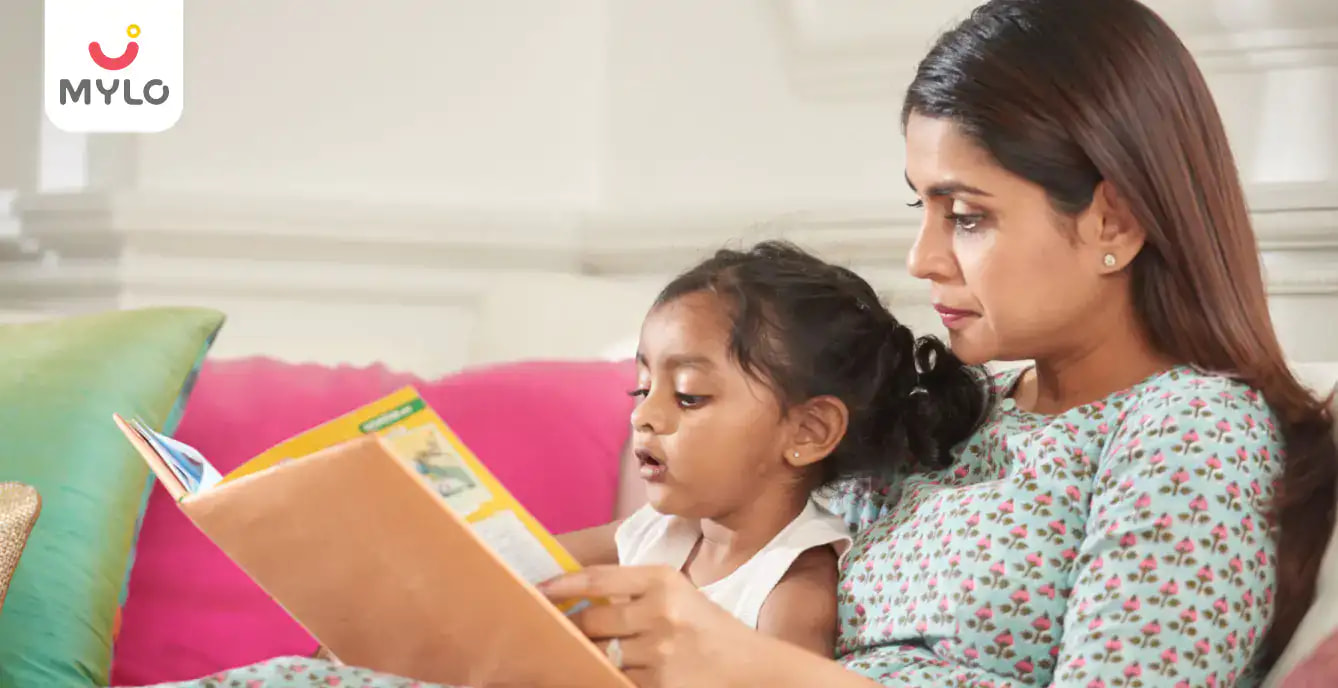Get MYLO APP
Install Mylo app Now and unlock new features
💰 Extra 20% OFF on 1st purchase
🥗 Get Diet Chart for your little one
📈 Track your baby’s growth
👩⚕️ Get daily tips

OR


Article Continues below advertisement
- Home

- Language Skills

- How to Improve Vocabulary for Toddlers?
In this Article
- What Should A 2 year olds Vocabulary Be?
- What Words Should A 3 year old Say?
- What types of words do toddlers use?
- How Should I Improve My Toddler’s Vocabulary?
- 1. Read A Book
- 2. Converse With Your Child
- 3. Teach Them Sensory Words
- 5. Let Them Play With Older Kids.
- 6. One Word At A Time
- 7. Sing Songs
- Conclusion
Language Skills
 2743
2743How to Improve Vocabulary for Toddlers?
Updated on 3 November 2023
Before a child can learn to read, they need to know a lot about common words and what they mean. Even though this may seem hard, there are easy ways to teach and increase vocabulary for toddlers. You probably do a few of these things every day or week.
Even if their child is experiencing speech delays, parents can still help them develop their language skills. In reality, a child's readiness for kindergarten increases the more parents do to assist in overcoming obstacles.
What Should A 2 year olds Vocabulary Be?
Most children at the age of two:
Article continues below advertisment
1. Use phrases and sentences with only two or three words.
2. Use a minimum of 200 words and a maximum of 1,000 words.
3. Use the "who," "what," "where," and "why" question formats, such as "Where is daddy?"
4. When prompted or asked, they usually respond with their first name.
5. Use pronouns like "I," "me," "my," and "my" to refer to themselves.
Article continues below advertisment
6. Usually, known and familiar people like friends and family can understand what the toddler is trying to say.
You may also like : Amazing Ways to Help Your Toddler Talk
What Words Should A 3 year old Say?
Some of the words that a three year old should know or words for toddlers to learn are they, him, her, he, she, their, this that, old, new, book, big, small, light, dark, hot, cold, rainy, shine, of, on, or, etc.
What types of words do toddlers use?
Hearing their child's first words is one of the most anticipated moments as a parent. What does it matter if you can't comprehend them? His first words ring out like bells in your head and stay with you forever. But do you know if your child is on track to reach typical language development milestones for his age?
According to research, a vocabulary for toddlers grows as soon as he or she begins to talk. Words he learns are added to the long list he keeps. How many words does a child of 28-30 months old typically use? At 18 months, most experts agree that a child can understand and use around 110 words. However, by the time they are 30 months old, children typically know between 500 and 546 words.
Here is a list of a few words that a toddler usually uses or words for toddlers to learn:
- Mommy/Mumma
- Daddy/Papa
- Grandpa
- Grandma
- Cat
- Dog/Doggie
- Hello/Hi
- Bye/Tata
- I
- Me
- You
- My
- Nose
- Eyes
- Hand
- Legs
- Hair
- Tummy
- Bat
- Ball
Also read : Top 10 Most Searched Proverbs For Kids
Article continues below advertisment
How Should I Improve My Toddler’s Vocabulary?
Parents should help and encourage their children to develop good habits. Toddlers need a little push in the right direction to help them develop their language skills. Here are some suggestions to expand vocabulary for toddlers:
1. Read A Book
This is one of the best suggestions for parents who want to help their young child learn more words. Read books with simple, repetitive text, such as board and picture books, first. Spell out the names of the photographs you've found. When you explain the visuals to your child, have their repeat the phrases you use. Make this a daily habit. Also, try some role-playing with your little ones. Act out your favorite book passages with your little one.
2. Converse With Your Child
To get the full effect, nothing beats conversing with a person face to face. Feel free to start a dialogue with your kid. If you take him on a walk, make sure to engage him in conversation and point out interesting items along the way. Put questions to him and see what he has to say. Let him know you're impressed by how well he's keeping up with the group. Vocabulary for toddlers grows as they listen attentively to what you have to say.
3. Teach Them Sensory Words
Do sensory exercises with your kid. Try asking them what they think the garden smells like after the year's first rain. Take them around to several locations and have them explain what they experience there in terms of sight, sound, smell, and touch.
4. Explore Your Surroundings
Article continues below advertisment
There are few better lecturers than the natural world. Exploring the natural world is a great way to learn things that can't be taught in a classroom or at home. To satisfy their natural curiosity, toddlers enjoy exploring the world around them. So take advantage of this chance to teach them and expand vocabulary for toddlers.
5. Let Them Play With Older Kids.
Your child will benefit greatly from interacting with kids of different ages, especially those older than them. They will learn new words, but they will also learn how to speak and act more appropriately in a variety of social contexts. Your child's self-esteem will rise due to their increased interaction with others.
6. One Word At A Time
You shouldn't overwhelm your child with new vocabulary every day. Instead, choose a new word each day and explain its meaning to your child. Try to get your child to say the word five times a day. Rewarding them when they do it right will increase their interest in the game, and you will watch that vocabulary for toddlers will improve quickly using this technique.
7. Sing Songs
Certain toddlers are more likely to respond positively to songs than to stories or even simple dialogue. Several songs can be used to introduce new vocabulary to young children. The songs "Head, Shoulders, Knees, and Toes" and "Old McDonald Had a Farm" are good places to start. If you want to keep your child interested and help them understand the song's message, don't forget to use suitable actions.
Also read : Top 10 Panchatantra Stories for Babies & Kids
Article continues below advertisment
Conclusion
You can see that helping to find words for toddlers to learn is an easy but important step on the way to finding success. When taking a child to the library or putting labels on things around the house, you must plan ahead. But teaching your child new words and encouraging them to use them will likely be integral to your daily routine.
References
1. Weisleder A, Fernald A.(2013). Talking to children matters: early language experience strengthens processing and builds vocabulary. Psychol Sci.
2. Walters C, Sevcik RA, Romski M.(2021). Spoken Vocabulary Outcomes of Toddlers With Developmental Delay After Parent-Implemented Augmented Language Intervention. Am J Speech Lang Pathol.
Article continues below advertisment



Written by
Khushboo Jain
Get baby's diet chart, and growth tips

Related Articles
Understanding RSV And Its Long-Term Impact On Lung Health In Preterm Infants
Preventing Respiratory Syncytial Virus (RSV) In Preemies: Essential Steps For New Parents
How Respiratory Syncytial Virus (RSV) Impacts Premature Babies Differently: What Every Parent Needs To Know
Adverbs: A Comprehensive Guide to help small children learn the usage of adverbs
Related Questions
Influenza and boostrix injection kisiko laga hai kya 8 month pregnancy me and q lagta hai ye plz reply me
745 views
Hai.... My last period was in feb 24. I tested in 40 th day morning 3:30 .. That is faint line .. I conculed mylo thz app also.... And I asked tha dr wait for 3 to 5 days ... Im also waiting ... Then I test today 4:15 test is sooooo faint ... And I feel in ma body no pregnancy symptoms. What can I do .
748 views
Baby kicks KB Marta hai Plz tell mi
759 views
PCOD kya hota hai
1318 views
How to detect pcos
55 views
Related Topics
RECENTLY PUBLISHED ARTICLES
our most recent articles

Diet & Nutrition
গর্ভাবস্থায় আলুবোখরা: উপকারিতা ও ঝুঁকি | Prunes During Pregnancy: Benefits & Risks in Bengali
(1,616 Views)

Diet & Nutrition
গর্ভাবস্থায় হিং | ঝুঁকি, সুবিধা এবং অন্যান্য চিকিৎসা | Hing During Pregnancy | Risks, Benefits & Other Treatments in Bengali
(853 Views)

Women Specific Issues
স্তনের উপর সাদা দাগ: লক্ষণ, কারণ এবং চিকিৎসা | White Spots on Nipple: Causes, Symptoms, and Treatments in Bengali
(2,734 Views)

Diet & Nutrition
গর্ভাবস্থায় পোহা: উপকারিতা, ধরণ এবং রেসিপি | Poha During Pregnancy: Benefits, Types & Recipes in Bengali
(270 Views)

Diet & Nutrition
গর্ভাবস্থায় মাছ: উপকারিতা এবং ঝুঁকি | Fish In Pregnancy: Benefits and Risks in Bengali
(1,424 Views)

Diet & Nutrition
গর্ভাবস্থায় রেড ওয়াইন: পার্শ্ব প্রতিক্রিয়া এবং নির্দেশিকা | Red Wine During Pregnancy: Side Effects & Guidelines in Bengali
(1,479 Views)
- ইনার থাই চ্যাফিং: কারণ, উপসর্গ এবং চিকিৎসা | Inner Thigh Chafing: Causes, Symptoms & Treatment in Bengali
- গর্ভাবস্থায় ব্রাউন রাইস: উপকারিতা ও সতর্কতা | Brown Rice During Pregnancy: Benefits & Precautions in Bengali
- Velamentous Cord Insertion - Precautions, Results & Safety
- Unlock the Secret to Flawless Skin: 7 Must-Have Qualities in a Face Serum
- Unlock the Secret to Radiant Skin: How Vitamin C Serum Can Transform Your Complexion
- Gender No Bar: 10 Reasons Why Everyone Needs a Body Lotion
- Unlock the Secret to Radiant Skin How to Choose the Perfect Body Lotion for Your Skin Type
- Top 10 Reasons to Apply a Body Lotion After Every Bath
- Communication in Toddlers: Milestones & Activities
- A Comprehensive Guide to Understanding Placenta Accreta
- Vulvovaginitis in Toddlers Causes, Symptoms and Treatment
- A Comprehensive Guide to Understanding Cerebral Palsy in Children
- Bitter Taste in Mouth During Pregnancy: Understanding the Causes and Remedies
- Subchorionic Hematoma: Causes, Symptoms and Treatments


AWARDS AND RECOGNITION
Mylo wins Forbes D2C Disruptor award
Mylo wins The Economic Times Promising Brands 2022
AS SEEN IN
















At Mylo, we help young parents raise happy and healthy families with our innovative new-age solutions:
- Mylo Care: Effective and science-backed personal care and wellness solutions for a joyful you.
- Mylo Baby: Science-backed, gentle and effective personal care & hygiene range for your little one.
- Mylo Community: Trusted and empathetic community of 10mn+ parents and experts.
Product Categories
baby carrier | baby soap | baby wipes | stretch marks cream | baby cream | baby shampoo | baby massage oil | baby hair oil | stretch marks oil | baby body wash | baby powder | baby lotion | diaper rash cream | newborn diapers | teether | baby kajal | baby diapers | cloth diapers |








